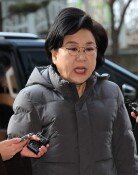Some Executives under Suspicion for Insider Trading
Some Executives under Suspicion for Insider Trading
Posted May. 22, 2003 21:58,
Daeduck GDS, a circuit board (PCB) producer, on May 15, announced its financial results for the first quarter of the year. Sales have increased 4.7% compared to that of the same period last year but profits have dropped 14%. On the same day, its stock price rose sharply, but fell by 10% in just two days, greater than the 3% drop in the KOSPI over the same period. Some securities companies predicted that the company`s performance for the second quarter could be much worse.
A senior official at the company sold 100,000 shares from April 9 to May 6 while stock prices were fluctuating between 11,800 won and 13,500 won. The company explained that as the won-to-dollar exchange rate has fallen, performance has temporarily worsened. The fact that he sold his stocks has nothing to do with the company`s performance.
Executive officers at some companies buy and sell shares ahead of the announcement of the performance. This is problematic because they basically are engaging in `insider trading,` being in the know regarding their company`s future plans.
The Korea Stock Exchange reported that executive officers at 12 of 100 companies, each with high market value for their listed stocks sold shares in April and May before first quarter announcements were released to the public.
Hyundai Motor held an investor relations meeting on May 13 to announce its performance for the first quarter. There was a 6% increase in sales profit while net profit tumbled 28% as compared to last year. Despite better than expected performance, falling stock prices were 3.1% over that of the stock price index. A senior official at the carmaker sold off 2,980 stocks at an average 29,300 won from May 9 to 12. Stock prices have since continued their steady descent after the report and have hovered at an average 28,275 won as of May 21.
An executive officer at INI Steel purchased 4,700 stocks at 4,500 won on April 1. As sales profits surged 106% in the first quarter, the stock price soared 28% to 5,800 won on May 21 in only one month. The company said that he bought them symbolically, predicting that his company would see a rosy future.
Executives and large shareholders at LG Card had sold off their shares even before the `credit-card mess.` They cashed in a total of 1,980,000 shares, 2.68% of the total number of shares available, when stock prices surged from April 27 to May 7.
Relevant companies reportedly stated that the executives had their own reasons and they could not know the performance reports in advance. They just sold off the shares they had because they will be given stocks as part of their yearly bonus, said spokesmen for LG Chemical and LG Petrochemical.
In fact, despite their company`s improved performance, some sold their stocks and suffered losses. Also, some sold just a limited number of shares and in such cases, it is hard to accuse them of taking full advantage of the information that they had gained if at all.
However, stock market experts do not agree with this view.
The reason for rising stock prices after the release of the quarterly report is that the insiders purchased company shares seeing it as a sign that they thought the then current prices were low, said Lee Chae-won at Dongwon Trust. And if they thought stock prices were low, they would not have sold them off, he added.
In the US, insider trading is severely punished according to securities transaction laws, said Kim Jung-soo at the Korea Stock Exchange. A company`s executives have to wait to sell off their shares after the quarterly reports even if they have access to undisclosed information, he added.
Na-Yeon Lee larosa@donga.com







